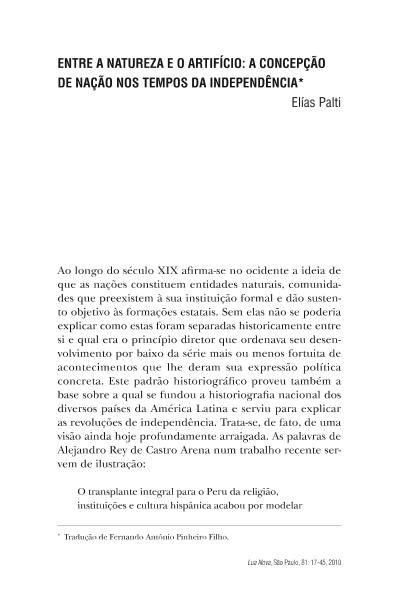Mostrar el registro sencillo del ítem
dc.contributor.author
Palti, Elias Jose

dc.date.available
2023-05-24T19:38:49Z
dc.date.issued
2010-09
dc.identifier.citation
Palti, Elias Jose; Entre a natureza e o artifício: A concepção de nação nos tempos da independência; Centro de Estudos de Cultura Contemporânea; Lua Nova; 81; 9-2010; 17-45
dc.identifier.issn
0102-6445
dc.identifier.uri
http://hdl.handle.net/11336/198668
dc.description.abstract
Como mostrou a literatura recente sobre a revolução da independência, a articulação de uma certa identidade nacional, contrariamente ao que afirmam as histórias nacionais tradicionais, não foi o ponto de partida senão o término final do processo de ruptura do vínculo colonial. E isso terá consequências historiográficas decisivas, posto que faz surgir a pergunta do que, então, o colocou em marcha. A chamada crítica "revisionista" abrirá as portas a esta pergunta só ao preço de declará-la insolúvel de antemão. A afirmação da persistência de imaginários tradicionais resulta em um ponto de vista da revolução como o resultado de uma série de acidentes, sem chegar a explicar porque os ditos acidentes tiveram as consequências que tiveram. Sem dúvida, alguma ideia de nação se encontrava operando então, posto que do contrário a vacância real não havia tido as consequências que teve. Definitivamente, pretender explicar tais sucessos sobre a base de um conceito de nação que, na realidade, só na segunda metade do século XIX receberia forma é um simples anacronismo; a negação da existência de toda ideia de nação (como se ela antes de mencionada fosse a única possível e verdadeira) também o é. À pergunta antes assinalada cabe então retraduzi-la do seguinte modo: que ideias de nação e autodeterminação puderam desenvolver-se no dito contexto político-intelectual e sem as quais não poderia haver se produzido o tipo de ruptura política que então se produziu; enfim, como pôde surgir a ideia de que os territórios americanos eram nações, e que puderam, portanto, reclamar direitos soberanos e autogovernar-se. O trabalho se propõe a reconstruir a série de deslocamentos político-conceituais que precederam a revolução da independência na América Latina e que, se bem que não a anteciparam, terminaram abrindo lugar para que esta se tornasse concebível.
dc.description.abstract
As shown by the recent literature on the revolution of independence, the articulation of a national identity, contrary to the assertions of the traditional national histories, was not the starting point but the end point of the process of rupture of the colonial ties. And this will have critical consequences for historiography, insofar as it raises the question of what was, then, what triggered that process. However, we must say that the criticism of the so-called revisionist school paves the way to this interrogation only at the price of declaring it unsolvable. The statement that the persistence of traditional 252 imaginaries results into a view of the revolution of independence as a consequence of a series of accidents and circumstances, without managing to explain why those circumstances had the consequences they had. No doubt, some idea of nation was then at work; otherwise, royal vacancy shoud not have had the effects it did. Lastly, if trying to explain that process on the basis of a concept of nation that, as a matter of fact, only in the second half of the nineteenth century would become available is anachronical, so is the denial of the existence of any notion of nation (as if the above mentioned concept of it were the only possible one). The previous question can thus be translated as follows: what ideas of nation and self-determination could have developed in that political and conceptual context, without which the kind of political rupture then occurred would not have possibly happen; in short, how could have emerged the ideas that the American territories of Spain and Portugal were nations, and that they could, therefore, postulate the possession of sovereign rights as such. The present paper intends to recreate the series of politico-conceptual reconfigurations that have preceded the revolution in Latin America which, albeit they did not anticipated it, indeed opened the doors for it to become conceivable.
dc.format
application/pdf
dc.language.iso
por
dc.publisher
Centro de Estudos de Cultura Contemporânea
dc.rights
info:eu-repo/semantics/openAccess
dc.rights.uri
https://creativecommons.org/licenses/by-nc/2.5/ar/
dc.subject
Historia
dc.subject
Intelectual
dc.subject
Latinoamericana
dc.subject
Nación
dc.subject.classification
Historia

dc.subject.classification
Historia y Arqueología

dc.subject.classification
HUMANIDADES

dc.title
Entre a natureza e o artifício: A concepção de nação nos tempos da independência
dc.title
Between nature and artifice: The conception of nation in times of the independence
dc.type
info:eu-repo/semantics/article
dc.type
info:ar-repo/semantics/artículo
dc.type
info:eu-repo/semantics/publishedVersion
dc.date.updated
2023-05-23T11:47:53Z
dc.identifier.eissn
1807-0175
dc.journal.number
81
dc.journal.pagination
17-45
dc.journal.pais
Brasil

dc.journal.ciudad
São Paulo
dc.description.fil
Fil: Palti, Elias Jose. Consejo Nacional de Investigaciones Científicas y Técnicas; Argentina. Universidad Nacional de Quilmes. Departamento de Ciencias Sociales. Centro de Historia Intelectual; Argentina
dc.journal.title
Lua Nova

dc.relation.alternativeid
info:eu-repo/semantics/altIdentifier/url/https://www.scielo.br/j/ln/a/gVz4SQG7wtmsJSVdPTF3m5F/?lang=pt
dc.relation.alternativeid
info:eu-repo/semantics/altIdentifier/doi/https://doi.org/10.1590/S0102-64452010000300003
Archivos asociados
